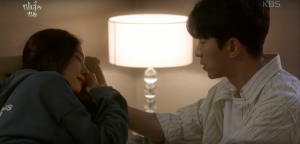
The second week of October was rife with new rom-com titles. Out of the bunch, Witch’s Courtroom caught my eye because of the two things: one, that it promised to breach the rarely tackled K-drama subject of sexual violence, and two, how it blatantly advertised its female character as inherently unlikable. I totally had to review it.
From the title of the series and the various teasers I saw, I was fully bracing myself for a female lead that would be similar to Song Cha-ok (Jin Kyung) of Pinocchio or Madam Jung (Kim Hye-ri) of Strongest Deliveryman; completely stone-faced, unsympathetic, one hundred percent career-oriented, and morally black in her ways.
Instead, Ma Yi-deum (Jung Ryeo-won) turned out to be more similar to the morally gray titular main character of Chief Kim. Quite the anomaly for a K-drama rom-com heroine, she has an affably evil type of antihero persona. Her ruthless, cutthroat, and cunning side is what makes her infamous at her work place. She spares no sympathy to any of the victims in her cases, manipulates evidence, and does whatever she has to in order to advance in her career even at the expense of others.

And yet, she is unexpectedly jocular and energetic. One can expect a fair share of charmingly quirky moments as she is onscreen, such as falling asleep in the men’s restroom, flashing a finger heart at her superior, or coercing her colleague to pretend to be her husband as she stays in a hospital. The first half of episode one serves to inject her with sympathy by dedicating itself to fleshing out her less than savory backstory, which is left relatively ambiguous for now. However, it is implied that her mother was either a rape victim or a witness to a horrendous sexual crime — who vanishes because the perpetrator of the crime whisks her away to some kind of mental facility.
While these little touches and the backstory help provide the foundation for a well-rounded character, it was the moments of open unguarded weakness that really made her feel three-dimensional. One scene that especially stood out to me was the one where she indulges herself on a drunken binge of cup ramen in front of her TV while going through an odd crying and laughing spell. The moment was brought on by the accumulation of stress: from being given a “reason you suck” speech by her boss and the pressure from her landlord to move out due to her inability to pay rent (which causes her to skimp on things like makeup and clothes, hence the title of this review), along with the memories of her missing mom that seemingly come to her mind whenever she’s having a rough time.

It was the sheer sense of relatability in the scene that made it so striking. She didn’t feel like a drama character having a contrived momentary spout of depression over a breakup or a hospitalized family member expressed via a steady stream of tears. She felt complicated and completely messy, like a genuine person.
The fact that she followed up by showing to work in a pair of shades while making a joke about the dangers of eating sodium at night to explain away her puffy crying eyes to her beleaguered colleagues made her even more oddly endearing. The scene was an adept way of showing how guarded Yi-deum actually is How, despite her generally bubbly personality, she is afraid to wear her heart on her sleeve. She shows her inner emotional fragility again as she drunkenly admits to a telemarketer that she is lonely and had a rough day, despite winning her court case; later crying in her sleep as she dreams about her mom.
There seems to be a division in opinion about her amongst the viewers. Some seem to find her actions horrifying, some find them justified, and others empathize with her but acknowledge the wrongness of what she does. But I suppose this is one of the hallmarks of a well-written character. Inevitably, some aspects of their personality will appeal to some people, while the same facets of their character might repel others.

This became especially apparent in episode four, as she faces the shark prosecutor’s dilemma: being forced into the shoes of the victim. As a man breaks into her house and records her nude body, the writers at first make it appear as if she would behave hypocritically by refusing to submit the video evidence and save her reputation. However, by the end of the episode, she reveals that it was all an act to reveal that the criminal had placed a video deleting app on the tablet where her nude videos were. Although she appears brazen and confident in court, a close-up of her fidgeting fingers betray her true feelings.
Some viewers feel that she deserved to be knocked down a peg, while others felt sympathetic for her. Furthermore, some interpreted the episode as a way for the audience to get their wish fulfillment of giving her a dose of her own medicine while others interpreted the entire episode as an opportunity for character development. Personally, I was one of the latter.
There was a scene at the end of the episode where the male lead asks if she really meant what she said in court about her experience changing her into a more moral prosecutor. Yi-deum then asks him if people ever change, to which he responds no, and she affirms it. It was a simple scene, but one that perhaps required a bit of reading in between the lines. On the surface, she implies that she is still the same prosecutor she was before, but there’s a wistful undertone to her comment; as if she wants to change or will attempt to, but is unsure if change is even possible for her.

The scene’s loaded ambiguity was what made it so commendable; it was an beautifully delicate way to hint at character development, or lack thereof. To effectively pull off a scene like this, good writing and a skilled actress is necessisary. Seriously, kudos to Jung Ryeo-won for pulling off such a difficult character with style while injecting in plenty of substance.
Here, though, lies the issue; Yi-deum literally steals the show. One of the drawbacks of having such a well-written female lead is that the bar is set that much higher for the male lead. And this is where Witch’s Courtroom starts showing cracks in its relatively smooth veneer. On paper, there’s nothing particularly wrong with the male lead. Yoon Hyun-min brings his usual charisma and intellectual charm to his role as Yeo Jin-wook, the newbie prosecutor. In addition, Jin-wook fills in the much-needed functional role of acting as the idealistic foil to Ma Yi-deum’s pragmatist.
He is briefly given a backstory in episodes five and six. We learn that he once tried to look for Yi-deum’s mother, that his mom was involved in her disappearance, and that he was spurred on to switch professions from psychiatrist to lawyer by experiencing the unfairness of the law second-handedly as he stands witness to a trial where a father who rapes his daughter gets away with a light sentence. His background as a psychiatrist is given as the reason for his empathy with the victims. However, despite the show’s attempt at character development, Jin-wook still pales in comparison to Yi-deum. He doesn’t come off as genuine, as chaotically human. His backstory and overall personality feels too clean, too contrived. He almost feels like a secondary character rather than a male lead.

In spite of the underdeveloped male lead, the romance between the two somehow doesn’t feel stilted or unnatural. Perhaps the remarkable chemistry of Yoon Hyun-min and Jung Ryeo-won accounts for this. After all, it wasn’t as if their initial romance plot line was written especially well. There is a heavy reliance on silly rom-com-esque coincidences (imagine finding out that the prosecutor who cajoled you into testifying for his case was assigned to the same division as you and turned out to be your landlord and neighbor). Despite this, the very few scenes they’ve had so far that involved romantic physical contact — like the forehead touching in episode four and the kiss in episode six — felt completely instinctive and unforced on the parts of the characters.
Though their initial encounters were quite cliche, the romance currently blossoming between the two leads is developing in an interesting manner. It is unclear as of now if Yi-deum’s joking predictions are right and Jin-wook harbors romantic feelings for her. He himself doesn’t seem to know why he caressed her sleeping face and let her kiss him. Perhaps his feelings for her are romantic, or perhaps he just has a strong sense of sympathy for her. Meanwhile, Yi-deum’s drunken kiss suggests that she has some attraction to Jin-wook. However, as her friend openly flirts with him in episode six, she doesn’t show any real signs of jealousy — she just seems amused. Maybe the kiss was just a fluke, or maybe she simply isn’t the jealous type.
Another way the characters add interest to the show is through their polar opposite ideologies serve as the driving forces behind the show, embedding acute moments of tension within the plot. Witch’s Courtroom doesn’t seem to favor one or the other yet; it highlights that both Jin-wook’s idealism and Yi-deum’s pragmatism have their flaws and merits. In the first case, it is Jin-wook’s compassion that helps unveil the fact that Professor Sun was the instigator of rape rather than the victim, while securing the testimony of the actual victim. Yet, it is Yi-deum’s pragmatism that nabs them the decisive phone recording evidence of the rape, which ultimately allows them to win the case (despite her questionable manipulation of the defense in utilizing it).

The next case is essentially centered around Jin-wook’s core belief that victims deserve sympathy because what happens to them is out of their control. And he is proven right. Yi-deum’s assertion that her carefulness will keep her from being a victim of a sexual crime is invalidated as the man plants secret cameras in her house. However, her pragmatism proves itself to be a virtue in the end. She puts the prospect of winning the case ahead of her own personal feelings, which proves crucial for getting justice for the other victims. Although it is unclear what her motives are for winning the case — advancing her career, helping out the victims, or a combination of both — it is shown that her pragmatism is the reason why she is able to catch on to the existence video deletion app and ultimately swallow any reservations to showing her nude video in court.
Hopefully, the show will continue along this vein rather than preachily championing Jin-wook’s idealism as the morally superior way to go. The show’s ideological neutrality makes it more interesting to watch. After all, it would definitely be far more entertaining to see Jin-wook slowly acquiescing the validity some of Yi-deum’s pragmatic habits with Yi-deum adapting some of Jin-wook’s idealistic approaches, rather than simply seeing Yi-deum completely renounce her former ways.

Moving right along, I will now discuss the show’s treatment of the weighty issues that it deals with. Witch’s Courtroom does a relatively good job of handling the topics of rape and sexual consent in its first six episodes. The discussion of female rape instigators in the first several episodes was done quite nicely. The commonly known but rarely discussed sufferings of male rape victims such as overbearing guilt and a sense of immasculation are all discussed with appropriate attention. The victim is portrayed in a sympathetic light, with the grappling shame caused by the social stigma against male victims due to gender norms being properly disseminated.
The sex video case is also portrayed with nuance, intelligence, and sensitivity. It is clearly shown that the issue of consent is frequently complicated, the lines being blurred especially when the people involved are lovers. Many of the victims consent to having sex videos recorded with the criminal under the condition that he deletes the video. Although he didn’t fulfill the latter part of the promise, this expectedly does not make for a very strong case in court on the part of the victims. Rather, the fact that the victims gave their consent weakens their own case. The case is shown to be complex, which matches the frequent reality being that such cases often take on the qualities of a catch 22 in which the side with the better lawyer and more compelling evidence can most quickly get out of.

The fact that the show is simultaneously a rom-com and a crime drama doesn’t take away from the gravity of these issues. Somehow, the elements of the two genres are placed together without undermining one another. Perhaps this is due to the way Witch’s Courtroom effectively blends the two polar opposite elements by keeping them in their natural state: completely separate. The more serious scenes that deal with heavy social issues are placed far apart in proximity from the more comical scenes. The two genres never actually touch, and that’s precisely how they work together. And the delicate balance between the two is preserved by the subtle style of comedy of the show. The humor isn’t so over-the-top that it stands in jarring contrast to the serious mood that the show takes with its touchy topics.
All in all, the first six episodes mount Witch’s Courtroom off to a solid start. Smart writing, excellent casting, and an extremely compelling female lead provide an excellent platform for the rest of the show to stand upon. Hopefully, the show can refurbish its weak point — the male lead — and continue to build off of its strong base. As the show progresses, I’m anticipating more character development for the male lead and secondary characters, as well as content that can delve into a deeper discussion of the show’s treatment of the sexual crimes it depicts.
(Images via KBS)



